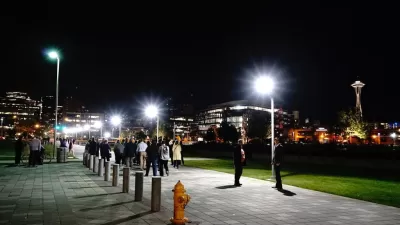At a recent conference on world cities, attendees from all over the world shared the impression that their cities do not receive enough respect from their national governments.
Grist's David Roberts was there and reflects on the perception of cities having a disproportionate amount of influence.
"As I talked with folks from cities around the world, again and again I heard frustration over the relationship between metropolitan areas and state or national governments. Just about everyone I talked to felt that their city did not receive the support it deserved based on the contributions it made. In most every country, cities contain most of the people and produce most of the economic activity, but state and national resources tend, for political reasons, to be spread evenly rather than concentrated on metros. Rural areas have disproportionate influence over state and national officials, so they end up getting more than they give, effectively siphoning resources out of metro areas.
This came up, unbidden, as I chatted with a couple of gentlemen from Karachi, Pakistan, during a visit to the soccer museum. It came up as I talked with a woman from Buenos Aires, Argentina, on the bus to the symphony. It came up with a guy from Houston, Texas, outside a cocktail party. And I heard it from more than one Sao Paulo native."
FULL STORY: Why do cities get so little respect from state and national governments?

Maui's Vacation Rental Debate Turns Ugly
Verbal attacks, misinformation campaigns and fistfights plague a high-stakes debate to convert thousands of vacation rentals into long-term housing.

Planetizen Federal Action Tracker
A weekly monitor of how Trump’s orders and actions are impacting planners and planning in America.

San Francisco Suspends Traffic Calming Amidst Record Deaths
Citing “a challenging fiscal landscape,” the city will cease the program on the heels of 42 traffic deaths, including 24 pedestrians.

Defunct Pittsburgh Power Plant to Become Residential Tower
A decommissioned steam heat plant will be redeveloped into almost 100 affordable housing units.

Trump Prompts Restructuring of Transportation Research Board in “Unprecedented Overreach”
The TRB has eliminated more than half of its committees including those focused on climate, equity, and cities.

Amtrak Rolls Out New Orleans to Alabama “Mardi Gras” Train
The new service will operate morning and evening departures between Mobile and New Orleans.
Urban Design for Planners 1: Software Tools
This six-course series explores essential urban design concepts using open source software and equips planners with the tools they need to participate fully in the urban design process.
Planning for Universal Design
Learn the tools for implementing Universal Design in planning regulations.
Heyer Gruel & Associates PA
JM Goldson LLC
Custer County Colorado
City of Camden Redevelopment Agency
City of Astoria
Transportation Research & Education Center (TREC) at Portland State University
Jefferson Parish Government
Camden Redevelopment Agency
City of Claremont



























